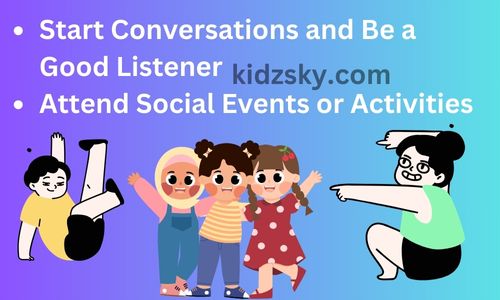Making new friends can sometimes seem daunting; how to make new friends whether you’re a child starting at a new school or an adult in a new city
However, building new friendships can be an exciting and rewarding experienceIn this guide, we’ll break down how to make new friends step-by-step, ensuring you have practical tips to follow regardless of age.
In this guide, we’ll break down how to make new friends step-by-step, ensuring you have practical tips to follow regardless of age.

Why Friendships Matter in How to Make New Friends
Friendships are essential to our emotional well-being and personal growthFriends can make us happier, support us during tough times, and encourage us to improveFriendships also teach us valuable life skills such as empathy, cooperation, and trustLearning to make new friends helps in every stage of life, from childhood to adulthood.
Step 1: Be Open and Approachable
The first step in learning how to make new friends is to have an open attitudePeople are more likely to approach someone who looks friendly, so smile, maintain eye contact, and offer a welcoming vibeThis positive body language can invite others to start a conversation at school, work, or a social event.
If you’re shy, that’s okay! Start small with a simple greeting or by commenting on something happening around you, like “That’s a great book you’re reading!” or “I love this music!”
Check also:- The Benefits of Music Education for Children: 6 Perfect e.g.

Step 2: Find Common Interests
One of the easiest ways to connect with new people is through shared interestsWhether it’s a sport, hobby, or activity, discovering mutual likes helps to form a natural bondFor example, if you’re in a new class, you could ask about your classmates’ favorite subjects or join after-school activitiesIf you’re an adult, joining clubs, classes, or social groups based on interests like reading, gardening, or fitness can be a great way to meet new people.
You’ll naturally meet others with similar passions by participating in activities you enjoyThis makes it easier to initiate conversations and make new friends.
Step 3: Start Conversations and Be a Good Listener
Starting a conversation is crucial when you want to know how to make new friendsHowever, it’s not just about talking; it’s also about listeningAsk open questions like “What do you like to do for fun?” or “How did you get into this hobby?” These types of questions invite others to share their interests, and by being genuinely interested in what they say, you create a stronger connection.
Being a good listener shows you care about the other person’s feelings and opinionsThis is a critical element in forming meaningful friendships.
Our Latest Blog:- How to Build Strong Sibling Relationships: 8 Points with e.g.

Step 4: Attend Social Events or Activities
If you’re wondering how to make new friends, one surefire way is by putting yourself in social settings where people gatherThis could include events at your school, workplace, or community centerVolunteering, attending local meetups, or attending a friend’s party are excellent opportunities to meet new people.
The more you participate in these social environments, the more chances you’ll have to connect with others and build lasting friendships.
Step 5: Stay Patient and Positive
It’s important to remember that not every attempt to make a new friend will be successful, and that’s completely okaySometimes, personalities don’t align, or people are not ready to open upThe key is to stay patient and remain positiveKeep trying, and don’t get discouraged if some interactions don’t lead to a friendship.
Building friendships takes time, and focusing on quality over quantity is essentialYou’ll eventually find the right friends if you keep a positive attitude.
Recently Published:- Benefits of Outdoor Activities for Kids: 6 Complete Guide

Step 6: Be Yourself
Authenticity is one of the most critical steps when learning to make new friendsDon’t change yourself to fit into a group or impress someoneReal friendships are based on honesty and being true to yourselfWhen you are yourself, you’ll attract people who genuinely appreciate and like you for who you are.
Step 7: Maintain Friendships
Once you’ve figured out how to make new friends, it’s essential to maintain those relationshipsFriendships require effort and timeStay in touch with your new friends by calling, texting, or planning to hang outCheck-in on them and show them you care by being supportive when they need it.
If you live far away or are busy, even sending a quick message to say “Hi” or “How have you been?” can go a long way in keeping the connection alive.
Read Kids Favorite:- Fun Indoor Activities for Kids: 5 Perfect during Rainy Days

How Parents Can Help Their Kids Make New Friends
Parents play a vital role in helping their children understand how to make new friendsThese are some ways parents can guide their kids:
- Encourage Participation: Encourage your child to join extracurricular activities, sports teams, or clubs where they can meet new people.
- Teach Social Skills: Teach your child to introduce themselves, ask questions, and listen actively during conversations.
- Arrange Playdates: For younger children, setting up playdates with classmates or neighborhood kids can help them build friendships in a comfortable setting.
- Lead by Example: Show your child how you interact with others by being friendly and open in social situations yourself.
Read Also:- Benefits of Perfect Toys for Kids: 6 Types, Choose the Best

How Teachers Can Help
Teachers can also help students learn how to make new friends by fostering a welcoming and inclusive classroom environmentHere’s how:
- Encourage Group Activities: Promote group work or team-based activities where students can collaborate and get to know each other better.
- Teach Inclusivity: Encourage students to be inclusive and kind to one another, ensuring no one feels left out.
- Assign “Friendship Buddies”: Pair students with others with similar interests or personalities, helping them build friendships through structured interactions.
Conclusion: Friendships Are Worth the Effort
Knowing how to make new friends is an important life skill that everyone should learnIt opens the door to fun, support, and growth, both emotionally and mentally
By being open, finding common interests, and staying true to yourself, you’ll find making new friends more accessible than you think.
Friendships enrich our lives, and whether you’re a child, teenager, or adult, there’s always room to build meaningful connectionsSo, get out there and start meeting new people — you never know when you’ll find your next great friend!
We request that you share this blog how to make new friends and spread the knowledge.
Admin creates all Photos used in this blog in Canva.




[…] Read also:- How to Make New Friends: 7 Points Especially for Children […]
[…] Read also:- How to Make New Friends: 7 Points Especially for Children […]
[…] Read also:- How to Make New Friends: 7 Points Especially for Children […]